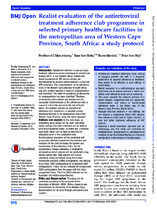| dc.contributor.author | Mukumbang, Ferdinand C. | |
| dc.contributor.author | Van Belle, Sara | |
| dc.contributor.author | Marchal, Bruno | |
| dc.contributor.author | Van Wyk, Brian | |
| dc.date.accessioned | 2018-07-06T08:36:14Z | |
| dc.date.available | 2018-07-06T08:36:14Z | |
| dc.date.issued | 2016 | |
| dc.identifier.citation | Mukumbang, F.C. (2016). Realist evaluation of the antiretroviral treatment adherence club programme in selected primary healthcare facilities in the metropolitan area of Western Cape Province, South Africa: a study protocol. BMJ Open, 6: e009977. | en_US |
| dc.identifier.issn | 2044-6055 | |
| dc.identifier.uri | http://dx.doi.org/10.1136/bmjopen-2015- 009977 | |
| dc.identifier.uri | http://hdl.handle.net/10566/3856 | |
| dc.description.abstract | INTRODUCTION: Suboptimal retention in care and poor
treatment adherence are key challenges to antiretroviral
therapy (ART) in sub-Saharan Africa. Communitybased
approaches to HIV service delivery are
recommended to improve patient retention in care and
ART adherence. The implementation of the adherence
clubs in the Western Cape province of South Africa
was with variable success in terms of implementation
and outcomes. The need for operational guidelines for
its implementation has been identified. Therefore,
understanding the contexts and mechanisms for
successful implementation of the adherence clubs is
crucial to inform the roll-out to the rest of South
Africa. The protocol outlines an evaluation of
adherence club intervention in selected primary
healthcare facilities in the metropolitan area of the
Western Cape Province, using the realist approach.
METHODS AND ANALYSIS: In the first phase, an
exploratory study design will be used. Document
review and key informant interviews will be used to
elicit the programme theory. In phase two, a multiple
case study design will be used to describe the
adherence clubs in five contrastive sites.
Semistructured interviews will be conducted with
purposively selected programme implementers and
members of the clubs to assess the context and
mechanisms of the adherence clubs. For the
programme’s primary outcomes, a longitudinal
retrospective cohort analysis will be conducted using
routine patient data. Data analysis will involve
classifying emerging themes using the contextmechanism-
outcome (CMO) configuration, and refining
the primary CMO configurations to conjectured CMO
configurations. Finally, we will compare the conjectured
CMO configurations from the cases with the initial
programme theory. The final CMOs obtained will be
translated into middle range theories.
ETHICS AND DISSEMINATION: The study will be
conducted according to the principles of the
declaration of Helsinki (1964). Ethics clearance was
obtained from the University of the Western Cape.
Dissemination will be done through publications and
curation. | en_US |
| dc.language.iso | en | en_US |
| dc.publisher | BMJ Publishing Group | en_US |
| dc.rights | This is an Open Access article distributed in accordance with
the Creative Commons Attribution Non Commercial (CC BY-NC 4.0) license,
which permits others to distribute, remix, adapt, build upon this work noncommercially,
and license their derivative works on different terms, provided
the original work is properly cited and the use is non-commercial. See: http://
creativecommons.org/licenses/by-nc/4.0/ | |
| dc.subject | Antiretroviral treatment adherence | en_US |
| dc.subject | Primary healthcare facilities | en_US |
| dc.subject | Western Cape | en_US |
| dc.subject | antiretroviral therapy (ART) | en_US |
| dc.title | Realist evaluation of the antiretroviral treatment adherence club programme in selected primary healthcare facilities in the metropolitan area of Western Cape Province, South Africa: a study protocol | en_US |
| dc.type | Article | en_US |
| dc.privacy.showsubmitter | FALSE | |
| dc.status.ispeerreviewed | TRUE | |
| dc.description.accreditation | ISI | |

